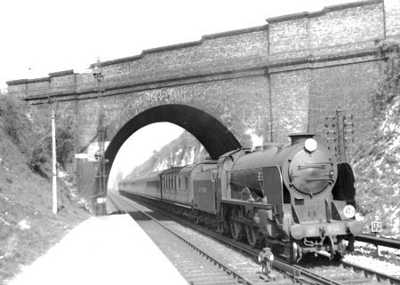Mr Stone and Teynham Station
In the Thirties it was a common belief that village railway stations were sleepy places where very little happened, at Teynham nothing could be further from the truth. Be it a ‘crocodile’ of excited children, off on a school outing; during the busy summer season when strawberries, cherries and other farm produce was dispatched to the London markets; when truck loads of hand made bricks from the local ‘fields’ left the station sidings or the ‘pokes’ of dried hops, for the breweries in the Autumn.
Incoming traffic included coal for the Co-op and Honeyball’s yards and, every Tuesday morning, a barrel of fish, packed in ice, for Mr Tomsett the fishmonger, which was generally met by a delegation of local cats! All this, plus the everyday passenger and parcel service was the responsibility of one man; Mr Stone the Station Master!
Mr Stone, lived with his wife, in the house adjoining the ‘up’ platform. He was a quietly efficient gentleman respected by the whole community. I can still picture him striding along the platform, his gold braided cap set firmly on his head; whistle attached to the lapel of his jacket and his waistcoat adorned with watch and chain. He was assisted by a station/ticket clerk, Ken Gambrell, a porter and three signalmen, All Sturmer; Bill Everard, my uncle, who lived at 2 Railway Cottages and joined the Southern Railway after service with the Medical Corps at Salonica, in the First World War and remained a signalman at Teynham for nearly forty years.
The third signalman was Tom Brett, a nice man who had a wooden leg. Tom played a vital role in the operations at the station, especially organising the trucks in the shunting yard, which was the opposite side of the line to the signal box. Shunting operations were carried with a system of whistle blasts, from the porter, a ‘toot’ on the engine whistle and a wave of recognition by the signal man from the ‘box’ window. As part of this operation used the main line it was a credit that it was accident free. Tom’s later years were spent at Sittingbourne as a ticket collector.
 There was also a steady stream of traffic across the line adjacent to the station: Mr. French’s farm workers, brickfield employees, going to and from work, tradesman and residents of Station Row and, not forgetting, Percy’s mum on Friday night, with jug in hand, bound for the ‘Tavern’ where Elsie or Beat waited eagerly to serve her. Few people used the footbridge, so it is remarkable, but sad, that with all this there was only one fatal accident.
There was also a steady stream of traffic across the line adjacent to the station: Mr. French’s farm workers, brickfield employees, going to and from work, tradesman and residents of Station Row and, not forgetting, Percy’s mum on Friday night, with jug in hand, bound for the ‘Tavern’ where Elsie or Beat waited eagerly to serve her. Few people used the footbridge, so it is remarkable, but sad, that with all this there was only one fatal accident.
We would stand on the side steps, to the footbridge, to await the arrival of the famous ‘Southern’ engines that stopped at Teynham: the ‘Eton’ and ‘Winchester’ of the ‘School’ Class and the ‘Nelson’ and ‘Raleigh’ of the ‘Admiral’ class. The ‘Granville’ was another famous engine that stopped at Teynham.
Considering how busy those times were I have often thought would it have not been wiser had the railways ‘chopped’ Lord Beeching, but then I have benefit of hindsight.